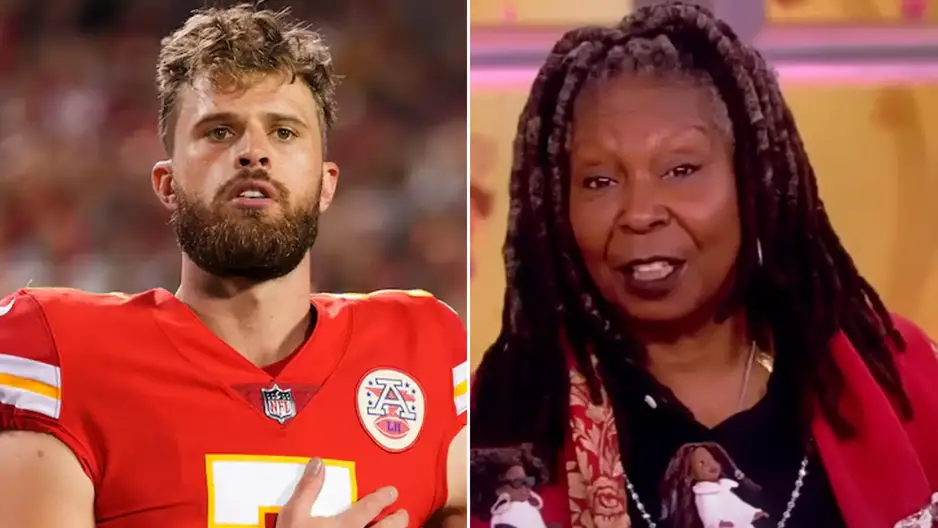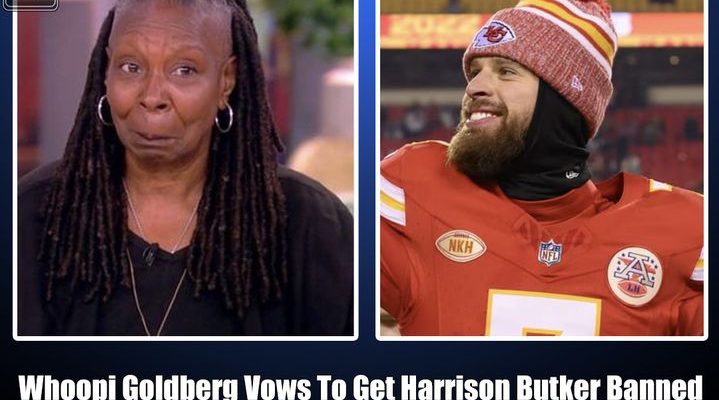
Harrison Butker recently made headlines for his comments during a public event, where he expressed views that many have criticized as being out of step with modern societal values. His remarks on topics such as abortion, diversity, and inclusion have ignited a firestorm of reactions, leading to calls for his dismissal from the NFL. It was against this backdrop that Whoopi Goldberg, known for her outspoken nature and no-nonsense approach, voiced her opinion on national television.
During the broadcast, Goldberg argued that Butker’s actions and words are detrimental to the spirit of unity and respect that sports teams should promote. “This isn’t just about free speech, it’s about representing an organization and its values,” Goldberg said. “If someone’s presence on the team is divisive and contrary to the values of inclusivity and respect, then swift action is necessary.” Her call for Butker’s ban reflects a broader sentiment that professional athletes, as public figures, bear a responsibility to uphold certain standards of conduct.
The response to Whoopi Goldberg’s remarks has been polarized. Supporters of Butker argue that demanding his banishment from the team infringes on his right to express personal views, regardless of whether one agrees with them. They advocate for a distinction between an individual’s professional responsibilities and their private opinions. On the other hand, Goldberg’s supporters insist that certain positions, especially when publicly articulated, are incompatible with the roles that individuals play in organizations that value diversity and inclusivity.
Goldberg’s statement raises important questions about the role of public figures in influencing matters of public discourse and policy. As a respected celebrity and opinion leader, Goldberg wields significant influence, which she has chosen to use in this case to advocate for what she perceives as organizational integrity and social responsibility. This incident underscores the impact celebrities can have, for better or worse, in amplifying societal issues and driving conversations.
The controversy goes beyond a single player or statement, touching on broader themes within sports and entertainment. It challenges leagues and teams to consider where they draw the line on various issues, from personal expressions of belief to actions taken on or off the field. Moreover, it highlights the ongoing struggle within society to balance free speech with the consequences of that speech, particularly in high-profile professions.
As the debate continues, it is clear that the resolution to this situation will set precedents for how similar issues are handled in the future. Teams and leagues may need to establish clearer guidelines and consequences regarding public statements by their players to avoid ambiguity and ensure fairness. Additionally, the episode is likely to influence how contracts and endorsements are managed, with potential clauses regarding public conduct and statements.
Whoopi Goldberg’s call to ban Harrison Butker from the Kansas City Chiefs is more than a reaction to a set of controversial remarks—it is a reflection of ongoing societal debates about the limits of free speech, the responsibilities of athletes as role models, and the role of celebrities in shaping public discourse. As this story unfolds, it will likely continue to spark discussions about freedom, responsibility, and the intersection of personal beliefs with professional obligations in the world of sports and beyond. Whether one agrees with Goldberg or not, her stance serves as a catalyst for necessary conversations about how societies and their cultural institutions handle the complexities of diverse opinions in the public sphere.


